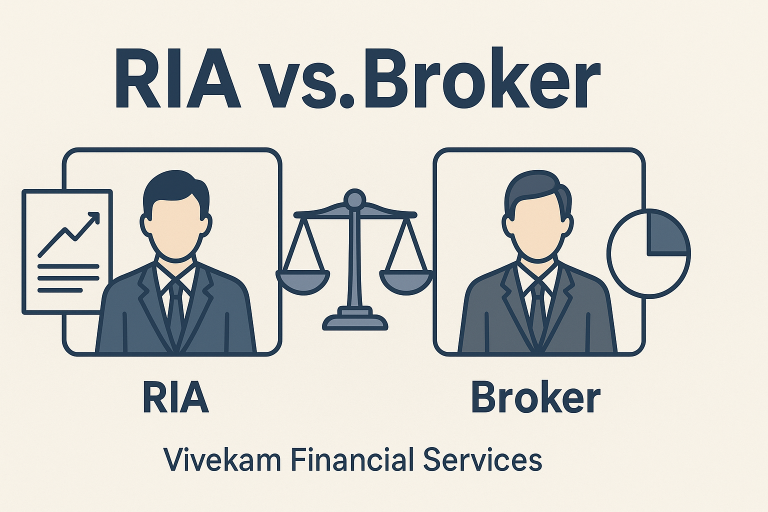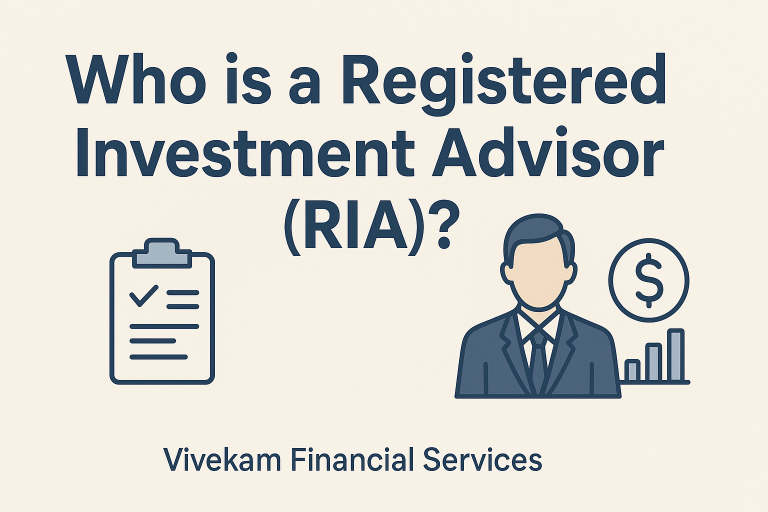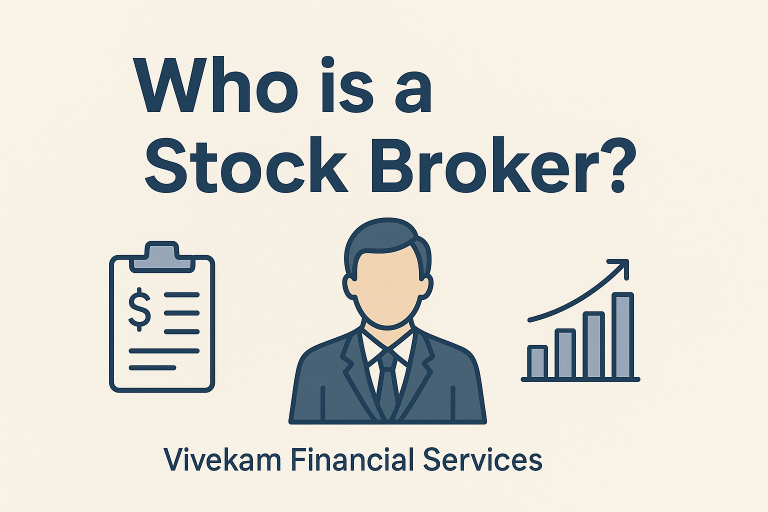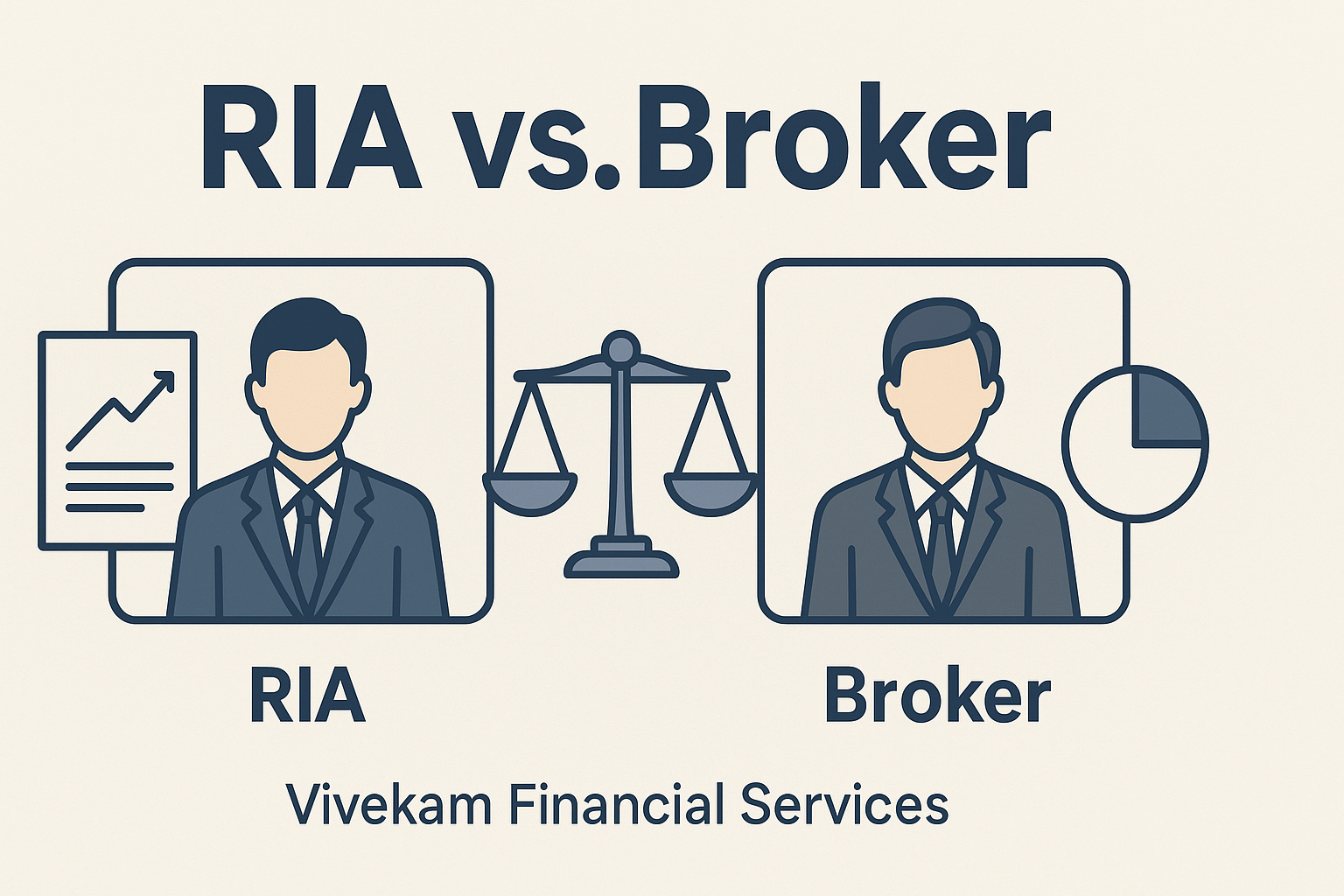RIA vs Broker: What’s the Real Difference for Investors?

When it comes to money, the smallest mistake can cost you lakhs. Choosing between a Registered Investment Advisor (RIA) and a stock broker isn’t just a technical decision—it’s the difference between someone who protects your wealth and someone who profits off your trades.
Most investors in India still don’t know how SEBI-registered Investment Advisors are different from top stock brokers in India. Let’s break it down in plain English so you can choose wisely.
Who is a Registered Investment Advisor (RIA)?

Definition and Legal Framework
An RIA is a professional legally bound to act in your best interest. In India, they’re registered with SEBI—which means if they give biased advice, they risk losing their license.
Role of SEBI-Registered Investment Advisors in India
RIAs don’t earn commissions from pushing products. Instead, they charge transparent fees—hourly, annual, or a percentage of your assets. This “fee-only” model ensures their advice is aligned with your wealth, not their wallet.
Duties and Fiduciary Responsibility of RIAs
- Put your goals ahead of their profits
- Disclose every rupee of fees upfront
- Build long-term strategies around taxes, retirement, and investments
- Stay unbiased—no hidden kickbacks from banks or AMCs
Who is a Stock Broker?

Stock Broker Definition and Functions
A stock broker is like your middleman for the markets. They execute your buy/sell orders on NSE, BSE, or other exchanges.
Role of Top Stock Brokers in India
Names like Zerodha, Upstox, ICICI Direct, HDFC Securities, and Angel One dominate the brokerage scene. They provide slick trading apps, research dashboards, and leverage options for traders.
Regulatory Oversight and SEBI Guidelines for Brokers
Brokers are SEBI-licensed, but here’s the catch: they’re held to a suitability standard. Translation: they just need to recommend something “okay” for you, not necessarily the best thing. Big difference.
Key Differences Between a Financial Advisor, Broker, and RIA
Compensation Models: Commission vs. Fee-Only
- Broker = commissions whenever you trade. More trades, more income for them.
- RIA = fees only. No hidden agenda to churn your account.
Fiduciary vs. Suitability Standard
- RIA = Fiduciary duty. Must always put your interest first.
- Broker = Suitability duty. “Suitable” isn’t the same as “best.”
Investment Strategy and Client-Centric Approach
- RIA = strategic partner. Focuses on retirement, tax efficiency, wealth preservation.
- Broker = execution engine. Great for short-term trades and speculation.
RIA vs. Broker: Which One Should You Choose?
When to Work with a Registered Investment Advisor
- You’re planning for retirement
- You want tax-smart investing
- You prefer unbiased advice
- You need holistic planning (beyond just stocks)
When to Work with a Stock Broker
- You actively trade stocks, derivatives, or IPOs
- You want fast order execution and margin facilities
- You enjoy market speculation
Hybrid Approach: Wealth Advisors and Wealth Management Services
Some firms blend both roles. A wealth advisor may create your financial roadmap while a broker executes trades. It’s like having a driver and a GPS.
Case Study: Choosing Between a Broker and an RIA in India
Meet Rohan, a 35-year-old IT professional.
- His goal: retire comfortably by 60.
- If he chooses a broker, he’ll get quick trades—but no roadmap for retirement.
- If he chooses a SEBI-registered investment advisor, he gets a structured plan with tax strategies and goal-based investing.
Which sounds smarter? Exactly.
Pros and Cons of Working with an RIA
Pros: fiduciary duty, transparent fees, holistic planning, unbiased advice.
Cons: upfront cost, minimum portfolio requirements, no direct access to IPOs.
Pros and Cons of Working with a Stock Broker
Pros: market access, lower fees (discount brokers), trading tools, fast execution.
Cons: commission conflicts, no fiduciary duty, short-term focus.
Financial Advisor vs Broker: Common Misconceptions

- “All advisors are fiduciaries.” Nope. Only SEBI-registered RIAs are.
- “Brokers always misguide you.” Wrong. Many brokers serve traders well—but don’t expect retirement planning.
- “RIAs are too costly.” Over time, they can save you lakhs by avoiding bad products.
- “I only need one.” Often, using both—an advisor for planning and a broker for trading—works best.
FAQs on RIAs, Brokers, and Investment Advisors
- What is the main difference between an RIA and a broker?
RIAs are fiduciaries, brokers are transaction facilitators. - Are RIAs regulated in India?
Yes, SEBI regulates and monitors them strictly. - Who should choose a stock broker over an RIA?
Traders, speculators, and short-term investors. - Can someone be both a financial advisor and broker?
Yes, hybrid advisors exist in India. - Are RIAs safer than brokers?
Legally yes, since RIAs must act in your best interest. - Which are the top stock brokers in India in 2025?
Zerodha, Upstox, ICICI Direct, HDFC Securities, Kotak Securities, Angel One.
Conclusion: Making the Right Choice for Your Financial Future
If you want wealth growth, retirement security, and unbiased advice, go with a Registered Investment Advisor.
If you want speed, trading opportunities, and market access, stick with a broker.
The smartest investors often use both—an RIA for planning, a broker for execution.







